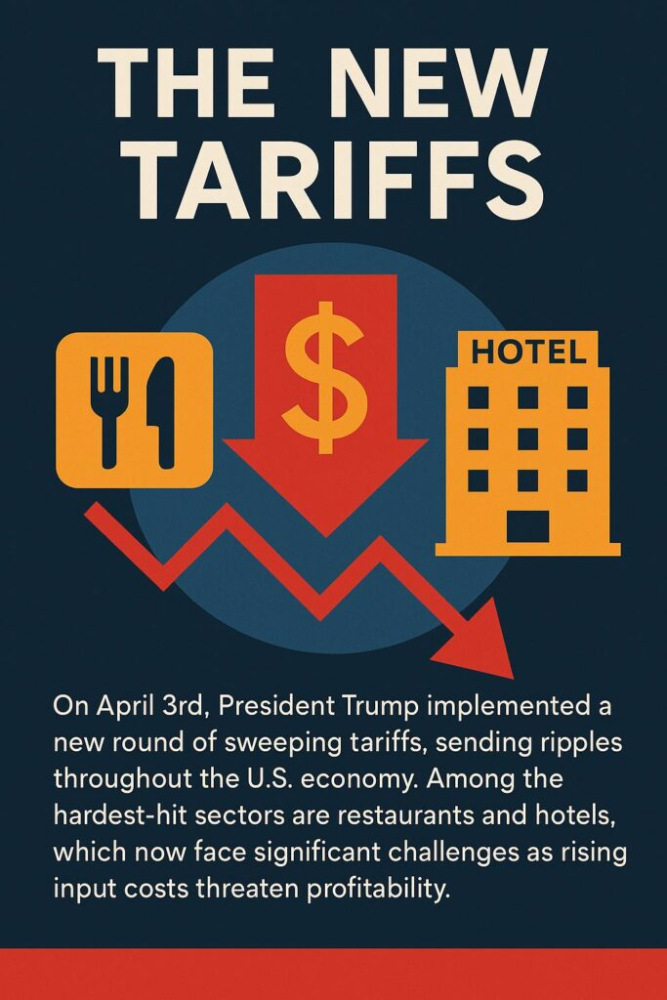- within International Law topic(s)
- with Senior Company Executives, HR and Finance and Tax Executives
- with readers working within the Accounting & Consultancy and Construction & Engineering industries

The New U.S. Tariffs
On April 3rd, President Trump implemented a new round of sweeping tariffs, sending ripples throughout the U.S. economy. Among the hardest-hit sectors are restaurants and hotels, which now face significant challenges as rising input costs threaten profitability. These tariffs, which impose a 10% baseline on imports from all countries and higher rates on specific nations, will disrupt supply chains and increase operational costs, threatening profitability for businesses reliant on imported goods.
The Impact of the Tariffs on Restaurants
The restaurant industry's dependence on imported goods leaves it vulnerable to the new tariffs. Restaurants across the U.S. rely on essential imports like food products, packaging materials, furniture, fixtures, and equipment. Even restaurants that primarily rely on local ingredients will likely see costs rise as increased demand for domestic goods drives prices higher.
Michelle Korsmo, President and CEO of the National Restaurant Association, highlighted the restaurant industry's concerns:
The biggest concerns for restaurant operators—from community restaurants to national brands—are that tariffs will hike food and packaging costs and add uncertainty to managing availability, while pushing prices up for consumers.
Tariffs are expected to significantly increase the prices of commonly imported items such as coffee, chocolate, and certain seafood. Coffee prices, in particular, could soar, given that the U.S. imports 99% of its coffee supply. Fresh produce prices are expected to rise by 4%, while overall food prices are projected to increase by 2.8%.
These price hikes will affect a broad range of essential goods commonly relied upon by restaurants, including:
- Specialty Foods: High-end and ethnic restaurants often depend on imported ingredients such as Italian olive oil, French cheeses, Scottish Salmon, Spanish seafood (e.g., anchovies, octopus), Asian spices (e.g., ginger, chilies), and certain fruits and vegetables that are out of season domestically.
- Beverages: Imported wines from France, Italy, Chile, and Australia, specialty beers from Europe, and various imported spirits will face substantial price increases. Even non-alcoholic beverages containing imported ingredients may see cost hikes.
- Tableware and Kitchen Equipment: While some items are domestically produced, high-quality china from Europe, specialized cooking equipment from overseas manufacturers, and various types of glassware are likely to experience price increases.
- Packaging: Even seemingly straightforward items like imported paper goods and specialized containers could become more expensive, depending on the source of raw materials and manufacturing processes.
The compounded effects of tariffs on these essential goods present a serious challenge for restaurants. To remain profitable, operators must rapidly adopt innovative strategies to mitigate rising costs and maintain service quality.
The Impact of the Tariffs on Hotels
The hotel industry also faces severe repercussions from the new tariffs. Tariffs on critical items like steel and aluminum will inevitably escalate construction and renovation costs, disrupting development plans and making expansion projects increasingly economically unfeasible. Hotels that rely on imported furniture, fixtures, and equipment (FF&E) face sharply rising procurement costs. Tariffs will drive up prices, even for hotels that source domestically manufactured products, as approximately half of all U.S. imports consist of inputs used in domestic manufacturing.
These tariffs will affect a wide range of essential goods critical to hotel operations, from linens and furniture to guest amenities and construction materials, significantly impacting their ability to maintain quality and profitability.
- Linens and Textiles: Many hotels rely on imported cotton for bedding, towels, and other linens due to cost considerations or specific quality preferences. Nearly all textiles are sourced from overseas, with a significant portion coming from China. These goods are expected to face tariffs of at least 54% on most items in the near future, resulting in substantial price increases for synthetic fabrics used in curtains, carpets, and sheets.
- Furniture and Fixtures: Imported furniture, lighting fixtures, and decorative items are commonly used in hotel rooms and public spaces, particularly those aiming for a specific design aesthetic. As tariffs drive up prices, hotels will struggle to maintain high-quality interior designs without raising costs.
- Amenities: Essential guest amenities such as imported soaps, lotions, or teas are likely to see significant price increases, impacting both guest satisfaction and operational budgets.
- Construction Materials: Increasing costs for construction materials will likely force many hotels to postpone or scale back planned renovations, undermining their ability to remain competitive and maintain high-quality standards.
The compounded effects of tariffs will likely strain the hotel industry. Without swift and strategic adjustments, many hotels will face declining profitability and potential closures as escalating costs become increasingly unsustainable.
The Tariffs' Broader Economic Implications on Restaurants and Hotels
While rising operational costs are the most immediate effect of the tariffs, their broader economic repercussions could prove equally damaging. These secondary impacts may undermine revenue, profitability, and long-term stability across the hospitality industry.
A primary concern is the potential for overall inflation. As tariffs drive up the prices of a wide range of imported goods, businesses across various sectors will likely pass these increased costs on to consumers. If inflation continues to rise, discretionary spending—particularly on dining out and travel—will likely decrease. Restaurants and hotels, which are heavily dependent on consumer spending, are especially vulnerable to these economic shifts.
Moreover, retaliatory tariffs imposed by other countries could significantly harm international tourism to the United States. As foreign governments respond to U.S. trade policies with their own tariffs, travelers from those nations may be less inclined to visit the U.S. due to higher costs or political tensions. A decline in international tourism would directly impact hotel occupancy rates and restaurant patronage, particularly in popular tourist destinations like New York City, Los Angeles, Miami, and Las Vegas.
Ultimately, these broader economic implications could pose substantial challenges for the hospitality industry. Without strategic adjustments, restaurants and hotels will struggle to maintain profitability and stability amid ongoing economic uncertainty.
Alternative Perspectives on the Tariffs
While the negative implications of tariffs on the restaurant and hotel industries are significant, it's important to acknowledge that some economists and policymakers believe tariffs can offer long-term benefits. The implementation of tariffs is a subject of ongoing debate among economists, with arguments often presented for their potential benefits, even if those benefits are contested or may take time to materialize.
Some proponents argue that tariffs can serve as a tool to protect domestic industries from foreign competition, potentially leading to increased domestic production, job creation, and greater national self-sufficiency. The idea is that by making imported goods more expensive, tariffs can encourage consumers and businesses to purchase domestically produced alternatives. Over time, this could lead to the growth of U.S.-based manufacturing and a more resilient domestic economy.
Some also believe that these tariffs are being used as leverage in international trade negotiations, to pressure other countries to reduce their own trade barriers or address perceived unfair trade practices. If successful, such negotiations could lead to more balanced and reciprocal trade relationships, potentially benefiting various sectors in the long run. It's also conceivable that countries facing U.S. tariffs might eventually react by lowering their own tariffs, which in turn could create an environment for the U.S. to reduce its tariffs, potentially lowering input costs for businesses across the board.
However, it's crucial to recognize that these potential benefits are often debated and may be offset by significant drawbacks, as highlighted throughout this post. Many economists express concerns that tariffs ultimately lead to higher prices for consumers, harm businesses that rely on imported goods, and can spark retaliatory measures from other countries, resulting in trade wars that negatively impact the global economy. Additionally, for domestic manufacturers to invest the necessary resources to satisfy domestic production needs, it would require assurances that these tariffs will remain after January 20, 2029. Without those assurances, such investment will likely not materialize. The actual long-term consequences of these tariffs will depend on a multitude of factors, including the responses of other nations, the adaptability of domestic industries, and the overall global economic climate
The Impact of The Tariffs on Tourism
Beyond the immediate financial strain caused by tariffs, broader political and economic factors are creating an increasingly hostile environment for the U.S. restaurant and hotel industries. Recent immigration policies, protectionist rhetoric, and the economic fallout from tariffs are alienating citizens from other countries, resulting in measurable declines in tourism—a critical revenue source for both sectors.
Potential visitors from countries most affected by the tariffs—particularly China and the European Union—are increasingly opting for alternative travel destinations. Many travelers cite negative perceptions of the U.S. government's immigration stance and trade policies as primary reasons for their reluctance to visit.
According to data from the U.S. Travel Association, international tourism to the U.S. has declined sharply over the past year. Visitor numbers from China have dropped by 17%, while arrivals from European countries have decreased by 12%. Restaurants and hotels in major tourist hubs such as New York City, Los Angeles, Miami, and Las Vegas are feeling the economic impact through reduced occupancy rates and diminished restaurant patronage. See Foreign visits into the U.S. fell off a cliff in March.
The combination of high tariffs and declining tourism revenue creates a double-edged sword that threatens profitability across both industries. Foreign tourists contribute billions of dollars annually to the U.S. economy, and even modest declines in visitor numbers can have severe repercussions.
Without strategic adjustments, declining tourism rates will continue to erode revenue, undermine profitability, and jeopardize long-term growth for U.S. restaurants and hotels.
Strategic Sourcing Solutions for Restaurants and Hotels
One of the most effective ways for restaurants and hotels to mitigate the negative impact of tariffs is to recalibrate their supply chains by sourcing essential goods from countries and regions with lower tariff rates. Shifting procurement strategies can significantly reduce operational costs while maintaining quality standards.
Instead of importing salmon from Scotland, restaurants can turn to Alaska's abundant salmon supply—a domestically sourced alternative free from heavy tariffs. Similarly, rather than importing olive oil from Italy, Spain, or Greece, establishments can consider California-grown olive oil, which has seen substantial growth in quality and availability in recent years.
The textile industry provides another example of potential cost-saving adjustments. Hotels that previously sourced table linens, curtains, and other fabrics from China—which now faces tariffs as high as 54%—can pivot to suppliers in Mexico or Peru, where the tariffs are significantly lower. Both countries offer high-quality textiles and competitive pricing, making them attractive alternatives.
Beyond food, beverages, and textiles, a broader shift in supply chain management is essential. Diversifying sourcing options helps businesses avoid over-reliance on high-tariff markets and improves supply chain stability. This strategy is particularly valuable for independent restaurants and hotels that may lack the purchasing power of larger chains but can benefit from regional partnerships and new supplier relationships.
Our law firm's international trade lawyers have been assisting numerous companies across various industries in recalibrating their supply chains to minimize their exposure to the latest tariffs. For a comprehensive, step-by-step approach to legally avoiding or reducing tariffs, we recommend reviewing our recently published Guide for LEGALLY Avoiding Today's and Tomorrow's U.S. Tariffs. This article provides insights into how businesses can strategically adapt their supply chains to reduce the impact of the new tariffs.
Conclusion
The implementation of President Trump's new tariffs presents a formidable and multifaceted challenge for the U.S. restaurant and hotel industries. Increased operational costs, disrupted supply chains, declining tourism, and potential broader economic repercussions demand proactive, strategic, and coordinated responses. While the negative impacts are undeniable, businesses have viable avenues to mitigate these effects, strengthen their resilience, and maintain profitability.
Navigating this evolving landscape successfully requires immediate, informed action. We encourage restaurant and hotel stakeholders to consult our Guide for LEGALLY Avoiding Today's and Tomorrow's U.S. Tariffs for detailed strategies to minimize their tariff exposure. Additionally, maintaining active engagement with industry associations like the National Restaurant Association and the American Hotel & Lodging Association is essential for staying updated on advocacy efforts and collaborative solutions.
We also encourage you to reach out to our firm's hospitality and international trade lawyers for personalized guidance on recalibrating your supply chain and minimizing tariff impacts.
Tariffs present substantial obstacles, but by embracing strategic adaptations, driving innovation, and actively engaging with available resources and industry networks, restaurants and hotels can enhance their resilience and work towards a more stable future. The businesses that respond decisively and proactively will be best positioned to weather current economic pressures and seize opportunities for long-term growth and stability.
To view the original article click here
The content of this article is intended to provide a general guide to the subject matter. Specialist advice should be sought about your specific circumstances.



